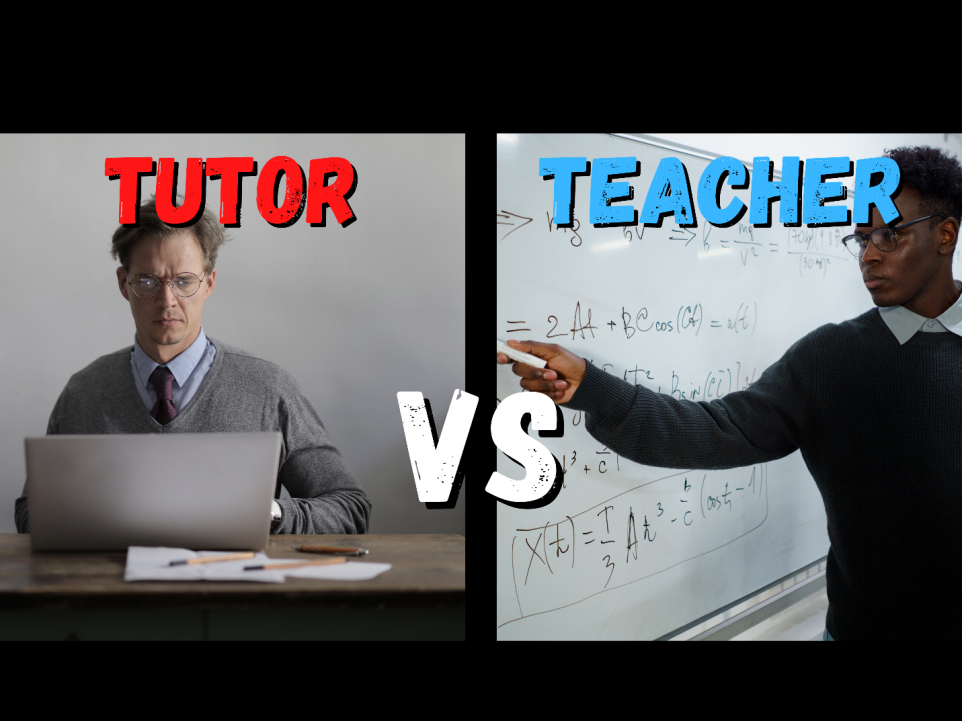The tutoring vs teaching distinction can be tough to define. Teachers and tutors both do great things, but their settings and purposes are different. It’s like trying to prune a rosebush with a chainsaw—it’ll probably work, but there’s a more suitable tool for the job.
A teacher needs to appeal to a group, while a tutor needs to appeal to one individual. Tutors and teachers might apply similar principles, but the difference is in the delivery.
Teachers Introduce, Tutors Expand
Teachers play a vital role in the education of our youth. They’re the ones who first expose students to new material, and that’s a massive responsibility. The best teachers want to engage students, deliver the core material, and convey the importance of what they’re teaching simultaneously. Doing so is easier said than done.
With upwards of 30 kids to manage and many units to cover, teachers have a lot on their plates. As a result, the odds are quite low that a teacher will make a great connection with each individual student. This is where tutors shine.
A tutor has the ability to spend more time with a student, focusing on precisely what they need the most. It’s a tutor’s goal to help students gather a deeper understanding and to find meaning and enjoyment in their coursework.
Tutors can teach students new things as well, and they often do. But, when it comes to tutoring vs teaching, what’s being taught is the main difference. Teachers are meant to teach students new content, and tutors teach students how to learn new content.
Tutors Want to See Your Work and Answer Your Questions
When pitting tutoring vs teaching, it’s important to remember the objective of each. It’s a teacher’s job to grade students, and that means marking questions right or wrong. Conversely, tutors support students and ensure learning without judgment.
For fear of being wrong, a child might feel anxious about showing their work at school. In a tutoring scenario, a tutor won’t mark a student right or wrong. That means students are at leisure to demonstrate their understanding in a risk-free environment.
Also, a teacher might leave little or no time for students to ask questions in class. Tutors, on the other hand, always encourage students to ask as many questions as they can. If a student decides a question is worth asking, the answer is worth remembering. Tutors know this is a great way to learn, so they love answering questions.
Tutors Aren’t Bound by a Curriculum
In a formal education setting, teachers are required to teach a government-approved curriculum. The curriculum contains the essentials, and that’s great, but what about students who wish to go further?
If a student takes particular interest in a certain subject, it can be hugely beneficial to work with a tutor. A good tutor can unlock a student’s potential, showing them things and enlightening them in ways school simply can’t. For a tutor, there’s nothing more gratifying than helping a student take their passion to the next level.
Also, since tutors have more freedom with their lessons, there’s greater opportunity to focus on teaching life skills. Students walk away from tutoring holding a shiny new toolkit filled with transferable skills. This works to provide them with the confidence to pursue their passions, leading to a lifetime of discovery and fulfillment.
While a student might not get extra credit at school for doing beyond-the-curriculum work with a tutor, the impression of the experience will last forever. Besides, passion can’t be graded!
Tutors Take Responsibility
If a student walks out of class having not understood something, it’s not the teacher’s responsibility to reteach the concept. It falls to the student to try to figure it out. This can feel like a burden, especially if the teacher hasn’t been appealing to that student’s learning style.
If a student walks away from a tutoring session having not understood something, it’s the tutor’s responsibility to find a new way to teach the concept. Tutors will not rest until their students are comfortable with their knowledge, and that means trying a variety of approaches.
Bright, intelligent, and enthusiastic students can lose interest in school if they feel too much pressure to understand what they don’t understand. Tutors actively work to alleviate this pressure by working through the material in new ways, instilling confidence in their students.
Tutors work fluidly, adapting their methods according to their students. No two students are the same, and tutors ensure that no two tutoring sessions are the same either. Each student receives a unique learning experience specially made with their success in mind.
Reaching Every Student, Regardless of Grade Level
A teacher’s job isn’t easy. While a grade 5 teacher might be teaching math to a grade 5 class, they’re really teaching a span of grade levels ranging from grade 3 to grade 7! That’s because each individual student is at a different place in their learning journey.
Of course, there’s no way for a teacher in a classroom to teach each student according to their knowledge base. Those with only a grade 3 understanding will struggle with the grade 5 material. At the other end of the spectrum, those with a grade 7 understanding will feel bored.
Outside of the classroom, tutors have many more options. If a grade 5 student is struggling with grade 3 concepts, their tutor is free to revisit those concepts. If the same grade 5 student needs more of a challenge, their tutor can introduce brand-new grade 7 concepts.
Tutors can modify the content of their sessions to better suit the needs of their students. No matter what, tutors teach students according to where they are, not where they’re supposed to be. Tutors believe in success for all students, regardless of grade level.
All Teachers Have Teaching Degrees, Some Tutors Don’t
The topic of credibility is a major point in the tutoring vs teaching discussion. All teachers must possess at least a bachelor of education degree from an accredited university. Some teachers go on to complete master’s degrees, and some might specialize in other areas of study as well. In short, all teachers are formally educated.
Tutors, on the other hand, are not required to have any formal education. Most tutors have some form of post-secondary education, although it might not be a teaching degree. Many agencies only hire tutors with teaching degrees, but some employ tutors who aren’t certified teachers.
Whether or not a formal education bears any importance is up to you. A teaching degree is certainly a plus, but it doesn’t necessarily define excellence in a teacher or a tutor. Now more than ever, people can learn through independent study and gather knowledge from beyond the realm of formal institutions.
Salman Khan, founder of the immensely successful Khan Academy, first started tutoring without an education degree. Since then, he has produced a massive selection of quality tutorials and videos widely used by students of all ages. To this day, he doesn’t possess an education degree. In other words, a “BEd” next to a tutor’s name ensures you they’ve attended university and completed an education degree, but it doesn’t immediately make them more credible than a tutor without it.
When it comes to tutoring vs teaching, education can be a fundamental difference. Still, there remains a spot of common ground: all tutors and teachers are lifelong learners, and they’re always looking to fill the gaps in their knowledge.
Why Tutoring vs Teaching? They Work Together!
Saying tutoring vs teaching makes it sound like a competition. In truth, teachers and tutors love to work together! On their own, teachers and tutors can be incredibly effective. Together, they make magic happen.
Tutors can work with teachers to get a better understanding of how their students are performing in school. This also allows tutors to access coursework in advance, preparing their students for what’s to come. As a result, students receive a high-powered education package greatly promoting their success.
When teachers and tutors team up, they can help students achieve incredible things. They naturally improve each other’s value, and their effectiveness together is greater than the sum of their skills.
See the Difference a Tutor Can Make
If you’d like to find out what a tutor-teacher combination can do for your child, feel free to contact us. Our tutors will work directly with your student’s teacher to ensure a premium education experience. Your child will develop valuable life skills alongside their coursework, guaranteeing success in school and beyond.
No matter your child’s goals in life, our twisted tutors can help make them a reality. We’ll craft a personalized education plan and guide your student every step of the way. It’s never too late to build good habits and start on the path to success—we’re ready when you are!
Tutors and teachers have another thing in common: they both love tried-and-true education resources! Check them out today!
We’re always pumping out quality educational content, so check out our Facebook page and YouTube channel to stay caught up!


Comments 3
Thank you so much for sharing these similarities and differences. This is actually one of the confusing roles in teaching. Despite this, teachers and tutors both have the same goal: to help the students with their academics.
You are very welcome! Thanks for stopping by!
Based on the comparison between tutoring and teaching, how does the environment created by a tutor differ from that of a teacher, and how does this impact a student’s learning experience? regards Telkom University Jakarta